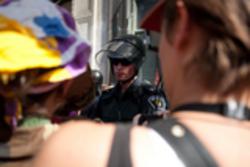G20 protesters, riot police face off in Toronto
About 2,000 protesters thronged Toronto on Friday in the biggest rally yet against the G20 summit, facing off against police in riot gear just blocks from the U.S. consulate.
Activists, labor groups and other protesters demanding Group of 20 countries do more to fight poverty marched through downtown streets but were blocked by police as they neared the security zone authorities have established around the venue for the G20 summit on Saturday and Sunday.
Shouting “Let Us March!”, the demonstrators held their ground as police, including officers on horseback, kept them from proceeding further. The police later said they had closed the security fence around the zone.

Canada has budgeted more than C$1 billion ($970 million) for security for the summits of the G20 and the Group of Eight rich nations, which held its meeting on Friday in Huntsville, Ontario, a resort town about two hours north of Toronto.
Nongovernmental groups have promised peaceful protests throughout the summit, seeking to highlight a range of issues including global poverty, women’s rights and labor.
But previous G20 meetings have attracted violent groups intent on disrupting the meetings or fighting with police. The U.S. State Department warned Americans to avoid downtown Toronto while the summits are under way.
One labor activist, seeking to whip up enthusiasm at the start of Friday’s march, urged protesters not to waver in the face of the heavy police presence in Toronto.
“Police are the shock troops of austerity — don’t be afraid, don’t be intimidated!” he said. “Down with everything the G20 stands for.”
A Canadian judge on Friday gave protesters a small victory by restricting police use of a controversial sound cannon for crowd control.
Toronto police agreed to amend their guidelines for use of the cannon, keeping volumes below the maximum and not using the device from close distances.
The portable loudspeakers are also known as sonic guns because the volume, specifically on the “alert” function that emits an ear-piercing beeping sound, can be turned up so high they can be used as weapons.
($1=$1.03 Canadian)
(Reporting by Pav Jordan, writing by Andrew Quinn, editing by Mario Di Simine)
Source: http://ca.reuters.com/article/domesticNews/idCATRE65O67C20100625?sp=true



